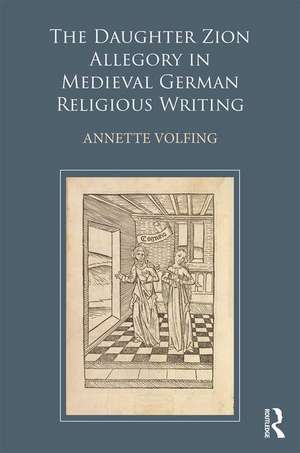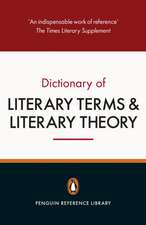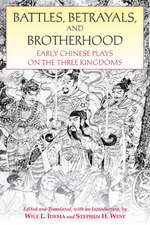The Daughter Zion Allegory in Medieval German Religious Writing
Autor Annette Volfingen Limba Engleză Hardback – 9 iun 2017
| Toate formatele și edițiile | Preț | Express |
|---|---|---|
| Paperback (1) | 259.51 lei 43-57 zile | |
| Taylor & Francis – 12 dec 2019 | 259.51 lei 43-57 zile | |
| Hardback (1) | 764.20 lei 43-57 zile | |
| Taylor & Francis – 9 iun 2017 | 764.20 lei 43-57 zile |
Preț: 764.20 lei
Preț vechi: 1027.40 lei
-26% Nou
Puncte Express: 1146
Preț estimativ în valută:
146.24€ • 151.82$ • 121.95£
146.24€ • 151.82$ • 121.95£
Carte tipărită la comandă
Livrare economică 24 martie-07 aprilie
Preluare comenzi: 021 569.72.76
Specificații
ISBN-13: 9781472469755
ISBN-10: 1472469755
Pagini: 232
Dimensiuni: 156 x 234 x 18 mm
Greutate: 0.45 kg
Ediția:1
Editura: Taylor & Francis
Colecția Routledge
Locul publicării:Oxford, United Kingdom
ISBN-10: 1472469755
Pagini: 232
Dimensiuni: 156 x 234 x 18 mm
Greutate: 0.45 kg
Ediția:1
Editura: Taylor & Francis
Colecția Routledge
Locul publicării:Oxford, United Kingdom
Cuprins
Preface
1. The Daugher Zion tradition: Origins and contours
2. Narrativizing the metaphor: Latin prose and German verse
3. German and Dutch prose versions
4. Male brides of Christ: Friedrich Sunder and Heinrich Seuse
5. Daughter Zion in Engelthal: Christine Ebner and Adelheid Langmann
6. Beating the bride into shape: Konrads Büchlein von der geistlichen Gemahelschaft and Christus und die minnende Seele
Conclusion
1. The Daugher Zion tradition: Origins and contours
2. Narrativizing the metaphor: Latin prose and German verse
3. German and Dutch prose versions
4. Male brides of Christ: Friedrich Sunder and Heinrich Seuse
5. Daughter Zion in Engelthal: Christine Ebner and Adelheid Langmann
6. Beating the bride into shape: Konrads Büchlein von der geistlichen Gemahelschaft and Christus und die minnende Seele
Conclusion
Notă biografică
Annette Volfing is Professor of Medieval German Studies at the University of Oxford and a Fellow of Oriel College, UK. She is a Fellow of the British Academy.
Descriere
Examining medieval German religious writing (verse and prose) and Dutch prose works, Annette Volfing suggests that the Daughter Zion allegory provides an excellent springboard for investigating key aspects of medieval religious and literary culture. She argues that the development of the allegory from the twelfth to the fifteenth centuries marks the striving towards a greater sense of equality and affective reciprocity with the divine, within the context of an erotic union.











